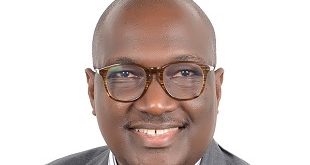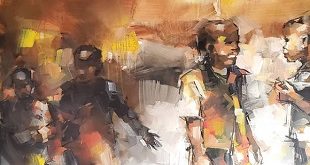
By Agencies
International community applauds as third top Rwanda rebel is arrested
Police in France on Monday arrested Rwandan rebel leader Callixte Mbarushimana, wanted for war crimes and crimes against humanity in the Democratic Republic of Congo, the French government said.

Mbarushimana ‘was arrested [on Monday} on French territory’ by French authorities acting on a warrant issued in September by the International Criminal Court in The Hague, a foreign ministry statement said.
The court said in a statement that Mbarushimana, 47, faces five charges of crimes against humanity and six war crimes charges for murders, rapes, torture and destruction of property in eastern DR Congo in 2009, said the ICC.
The Democratic Liberation Forces of Rwanda (FDLR) have launched ‘Widespread and systematic attacks against the civilian population to trigger a humanitarian disaster,’ according to the prosecutor’s office in The Hague. Mbarushimana, who is one of the top FDLR leaders, is accused of using Eastern Congo as a base to fight and gain influence in Rwanda by terrorizing civilians to demonstrate its power.
‘In 2009, the F.D.L.R. leadership decided to attack civilians in the North and South Kivu Provinces in order to create a massive humanitarian catastrophe; the F.D.L.R. then tried to blackmail the international community and to extort concessions of power, in exchange for ending the atrocities,’ a statement from the prosecutor’s office said. ‘As a result of this deadly blackmail, victims were killed, raped and forcibly displaced, and entire villages were razed to the ground.’
Shortly after the arrest ICC Chief Prosecutor Luis Moreno Ocampo said he commended France for a smooth and efficient operation.
‘We are grateful to the French authorities for executing the arrest warrant and we are thankful for the excellent cooperation of the many parties involved in the investigation, including France, Germany, the DRC and Rwanda. This is a clear example of positive complementarily in action,’ said Ocampo.
He said the arrest of Mbarushimana was a ‘crucial step in efforts to prosecute the massive sexual crimes committed in the DRC’ by the former Ex-FAR rebels who have wrecked havoc in the region since 1994.
Mbarushimana was arrested in Paris, where he has lived as a leader-in-exile of the FDLR, having received refugee status in France in 2003. His activities abroad, however, have been tracked for more than 18 months in several countries, including France, Germany, Congo and Rwanda, according to a court official.

Now the court must decide on whether Mbarushimana, will be transferred to the international court in The Hague. Because the decision can be appealed, this process could take several days or more.
The arrest follows a United Nations report about the ongoing violence in Congo, which has been driven primarily by mineral wealth and political control in the Great Lakes Region. The report, which documents violence that left up to four million people dead between 1993 and 2003, shows that at least six national armies, including Rwanda, Uganda, Dr Congo, Zimbabwe, Angola and Burrundi, and over 20 militias, were complicit in the slaughter.
The FDLR traces its roots to Rwandan army and Hutu Interahamwe extremist militia members who fled to DR Congo, called Zaire at the time, when Tutsis took power in Kigali in July 1994 following the genocide in Rwanda.
The fighters formed the army that became the FDLR, launching attacks across the border in Rwanda and trying unsuccessfully to topple the Kigali regime in 2001.
In 2009 UN-backed Congolese forces beat back the FDLR, which is accused of carrying out numerous atrocities against civilians.
According to the New York-based Human Rights Watch, the FDLR committed at least 630 murders of civilians between January and September 2009.
Mbarushimana is being accused of crimes that were allegedly committed during a series of ‘widespread and systematic attacks’ by FDLR fighters against civilians in the Nord Kivu and Sud Kivu provinces, according to ICC prosecutors.
They said there were reasonable grounds to believe Mbarushimana ‘personally and intentionally contributed’ to plotting ‘widespread and systematic attacks against the civilian population in order to create a humanitarian catastrophe’ which could be exploited for political gain.
Mbarushimana is the fourth person arrested by the ICC in the context of the situation in the DRC, and the first person indicted for crimes committed in Kivu. Ignace Murwanashyaka and Straton Musoni, two other FDLR leaders, were apprehended by Germany authorities last year. The duo was denied bail by the German Court in June.

The arrest was welcomed by numerous countries including Congo and Rwanda. In Kinshasa, government spokesman Lambert Mende said, ‘It’s good news for the Democratic Republic of Congo and the whole Great Lakes region.’
Mende added that, ‘Mbarushimana led from Europe the FDLR’s armed bands which spread death and destruction in our country and threatened security in their own country,’ Rwanda.
In Kigali, the Minister of Justice and Attorney General, Tharcisse Karugarama, said that the arrest of Mbarushimana, is a ‘first step’ towards the international community coming up to apprehend the heads of the terrorist group roaming freely.
‘For us, we think anybody arresting anyone for such crimes is a positive development and as the government of Rwanda, we welcome that. We want to congratulate the ICC for having taken that bold initiative,’ he said. ‘It is one step at ago and that is one good step. We hope ICC will continue to fulfill other steps to apprehend these wanted people. It was long overdue.’
The Executive Secretary of the National Commission for the Fight against Genocide (CNLG) Jean de Dieu Mucyo, also welcomed the arrest. ‘It is a positive development. We hope justice will be delivered. It is high time the international community took its responsibility. Our worry is that sometimes countries go back on their decision and release such people, we hope it won’t be the case.’
Mucyo said it was time that the international community acted on arresting all wanted criminals still on the run.
In New York, UN Secretary-General Ban Ki-moon’s special representative on sexual violence in conflict said she considered the arrest as sending an ‘important signal’ to other suspects.
‘This is a very important signal to all perpetrators in the DRC that crimes of sexual violence are not tolerated and that the international community is fully committed to bringing these individuals to justice,’ said Margot Wallstrom.
 The Independent Uganda: You get the Truth we Pay the Price
The Independent Uganda: You get the Truth we Pay the Price



